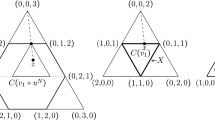Abstract
A family of core extensions for cooperative TU-games is introduced. These solution concepts are non-empty when applied to non-balanced games yet coincide with the core whenever the core is non-empty. The extensions suggest how an exogenous regulator can sustain a stable and efficient outcome, financing a subsidy via individual taxes. Economic and geometric properties of the solution concepts are studied. When taxes are proportional, the proportional prenucleolus is proposed as a single-valued selection device. An application of these concepts to the decentralization of a public goods economy is discussed.
Similar content being viewed by others
References
Aumann RJ, Maschler M (1964) The bargaining set for cooperative games. In: Dresher M, Shapley L, Tucker A (eds) Advances in game theory. Princeton University Press, Princeton, pp 442–476
Border KC (1985) Fixed point theorems with applications to economics and game theory. Cambridge University Press, Cambridge
Davis M, Maschler M (1965) The kernel of a cooperative game. Naval Res Logist Q 12: 223–259
Dréze J, LeBreton M, Savvateev A, Weber S (2007) ‘Almost’ subsidy-free spatial pricing in a multi-dimensional setting. CORE Working Paper 2007/30, Université catholique de Louvain
Grotte JH (2000) Computation of and observations on the nucleolus, the normalized nucleolus and the central games. Master’s thesis, Cornell University, Ithaca
Hwang YA, Sudhölter P (2000) Axiomatizations of the core on the universal domain and other natural domains. Int J Game Theory 29(4): 597–623
Kannai Y (1992) The core and balancedness. In: Aumann RJ, Hart S (eds) Handbook of game theory with economic applications, vol 1. North-Holland, New York, pp 355–395
Kwon Y, Yu P (1977) Stabilization through taxation in n-person games. J Optim Theory Appl 23(2): 277–284
Lucchetti R, Patrone F, Tijs SH, Torre A (1987) Continuity properties of solution concepts for cooperative games. OR Spektrum 9(2): 101–107
Mas-Colell A (1980) Efficiency and decentralization in the pure theory of public goods. Q J Econ 94(4): 625–641
Maschler M, Peleg B, Shapley L (1979) Geometric properties of the kernel, nucleolus, and related solution concepts. Math Oper Res 4(4): 303–338
Moulin H (1985) The separability axiom and equal-sharing methods. J Econ Theory 36(1): 120–148
Moulin H (1995) Une évaluation de la théorie des jeux coopératifs. Rev d’Economie Politique 105(4): 617–632
Orshan G, Sudhölter P (2001) The positive core of a cooperative game. Discussion Paper 268, Center for Rationality and Interactive Decision Theory, Hebrew University of Jerusalem
Peleg B (1986) On the reduced game property and its converse. Int J Game Theory 15(3): 187–200
Schmeidler D (1969) The nucleolus of a characteristic function game. SIAM J Appl Math 17(6): 1163–1170
Shapley LS, Shubik M (1966) Quasi-cores in a monetary economy with nonconvex preferences. Econometrica 34(4): 805–827
Tadenuma K (1992) Reduced games, consistency, and the core. Int J Game Theory 20(4): 325–334
Thomson W (2003) Axiomatic and game-theoretic analysis of bankruptcy and taxation problems: a survey. Math Soc Sci 45(3): 249–297
Tijs SH, Driessen SH (1986) Extensions of solution concepts by means of multiplicative ε-tax games. Math Soc Sci 12(1): 9–20
Wooders MH, Zame WR (1984) Approximate cores of large games. Econometrica 52(6): 1327–1350
Young H (1985) Monotonic solutions of cooperative games. Int J Game Theory 14: 65–72
Young HP, Okada N, Hashimoto T (1982) Cost allocation in water resources development. Water Resour Res 18(3): 463–475
Zhao J (2000) The core in an oligopoly market with indivisibility. Econ Theory 16: 181–198
Zhao J (2001) The relative interior of the base polyhedron and the core. Econ Theory 18(3): 635–648
Author information
Authors and Affiliations
Corresponding author
Additional information
We wish to thank the editor, a referee, an anonymous reviewer, Beth Allen, Marc Dudey, Yakar Kannai, Herve Moulin, Marcel Richter, Luis Sánchez-Mier, and the participants in the Microeconomic Theory Workshop at Rice University for their helpful comments.
Rights and permissions
About this article
Cite this article
Bejan, C., Gómez, J.C. Core extensions for non-balanced TU-games. Int J Game Theory 38, 3–16 (2009). https://doi.org/10.1007/s00182-008-0135-4
Accepted:
Published:
Issue Date:
DOI: https://doi.org/10.1007/s00182-008-0135-4



